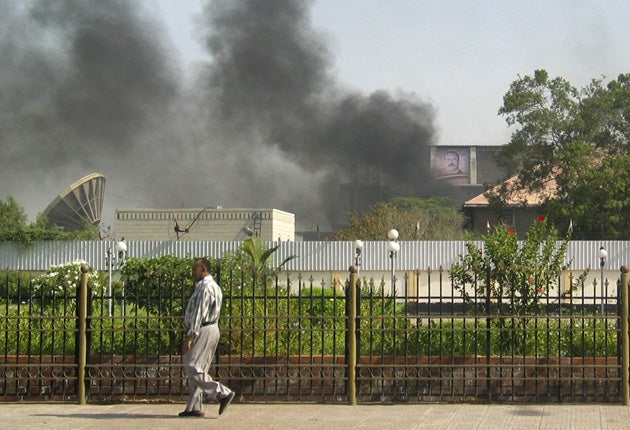Al-Qa'ida boosted by hit on Yemeni secret police

Your support helps us to tell the story
From reproductive rights to climate change to Big Tech, The Independent is on the ground when the story is developing. Whether it's investigating the financials of Elon Musk's pro-Trump PAC or producing our latest documentary, 'The A Word', which shines a light on the American women fighting for reproductive rights, we know how important it is to parse out the facts from the messaging.
At such a critical moment in US history, we need reporters on the ground. Your donation allows us to keep sending journalists to speak to both sides of the story.
The Independent is trusted by Americans across the entire political spectrum. And unlike many other quality news outlets, we choose not to lock Americans out of our reporting and analysis with paywalls. We believe quality journalism should be available to everyone, paid for by those who can afford it.
Your support makes all the difference.Al-Qa'ida gunmen have stormed a government intelligence centre in Yemen's second city, killing 11 people and freeing prisoners in a surprise attack in retaliation against a US-supported government offensive.
The successful assault in the port city of Aden on the supposedly well-protected secret police headquarters underlines the weakness of the Yemeni government. In addition to al-Qa'ida it faces threats from secessionists in the southern half of the country and Shia insurgents in the north.
The attack "bore the hallmark of al-Qa'ida", said Yemen's Supreme Security Committee, adding that seven government security men, three women and a seven-year-old child were killed in the attack early on Saturday. An eyewitness was quoted as saying that the gunmen were dressed in uniform and parked their vehicles near the Crescent Hotel. Yesterday the government claimed to have arrested the suspected mastermind of the attack, who it also blamed for a bank robbery last year that had been tied to al-Qa'ida.
Firing rocket-propelled grenades and throwing hand grenades, the gunmen burst into the entrance of the intelligence headquarters in a well-off district overlooking the sea. During a half-hour gun battle several guards threw down their weapons and fled.
The gunmen were able to free several prisoners before retreating. "We were hit where we least expected it," admitted Yemeni Information Minister, Hassan al-Lozy. "This is a serious escalation from these terrorist elements," he said.
Yemen provides ideal conditions for al-Qa'ida because of its mountainous terrain, limited government authority, widespread poverty and well-armed tribes able to defy the state.
Abdul Karim al-Eryani, a presidential adviser and former prime minister, told The Independent that "al-Qa'ida have about 500-700 recruits in Yemen".
He said their main base is in Marib governorate, east of the capital, Sanaa, but they also had strength in Abyan and Sabwa governorates east of Aden. He added that "I think they have money, since the tribes allow them to stay".
The nearest al-Qa'ida base area to Aden is Abyan, which is mountainous and is flanked by Sabwa province, to which al-Qa'ida members could retreat if under pressure, said Mr Eryani. Around Marib there have been skirmishes between government forces and al-Qa'ida – a colonel and two soldiers were killed earlier this month and tribesmen blew up an oil pipeline in retaliation for an army raid on a tribal chief suspected of harbouring al-Qa'ida.
Mr Eryani said that "the best strategy towards al-Qa'ida is to keep them moving". He believes that al-Qa'ida is not strong enough to be an existential danger to the state, but it is strong enough to do damage.
The US began to speak of Yemen as being an important front for al-Qa'ida after it was revealed that Umar Farouk Abdul Mutallab, the Nigerian student who tried to blow up a plane over Detroit at Christmas, received inspiration and advice during a visit to Yemen.
The government had already been receiving American military aid in combating al-Qa'ida, which it was loath to acknowledge in order not to offend nationalist feelings among Yemenis.
Al-Qa'ida is likely to find supporters in Yemen, whose 23 million people are among the poorest in the Arab world. Some 40 per cent are unemployed.
The country has never recovered from 850,000 Yemeni workers being expelled from Saudi Arabia and the Gulf states after the invasion of Kuwait in 1990 because Yemen was accused of sympathising with Saddam Hussein. Oil revenues are declining and there is a chronic water shortage.
"Southern secessionists pose a greater threat to the country than al-Qa'ida," said Mr Eryani. North and south Yemen united in 1990 and fought a bloody civil war in 1994.
There have been frequent demonstrations by angry southerners in recent years and two police officers were killed in an ambush in the southern city of Dalea yesterday after government forces surrounded it.
The government is also trying to contain a Shia insurgency in the north. The US and Europe have seen Yemen's problems mainly in security terms.
Mr Eryani says that the only solution is for Yemenis to be allowed to work once again in wealthy oil states in the rest of the Arabian peninsula. Otherwise the crisis in Yemen will only deepen.
Join our commenting forum
Join thought-provoking conversations, follow other Independent readers and see their replies
Comments